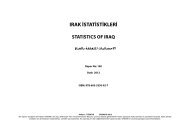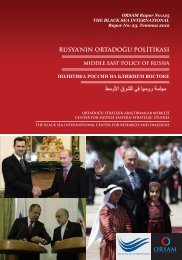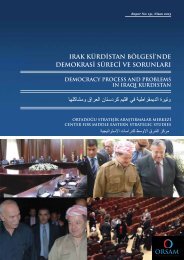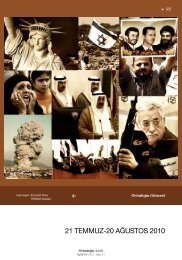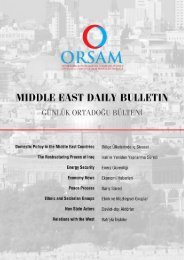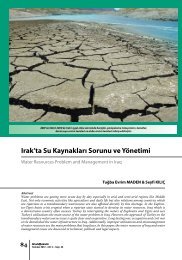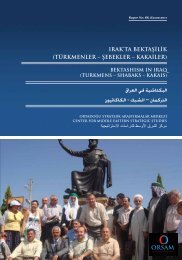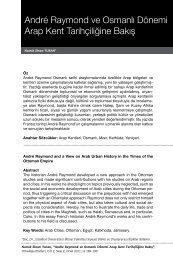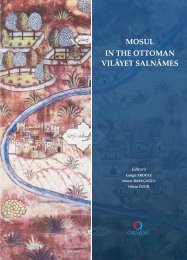Full text - orsam
Full text - orsam
Full text - orsam
Create successful ePaper yourself
Turn your PDF publications into a flip-book with our unique Google optimized e-Paper software.
ORSAM<br />
CENTER FOR MIDDLE EASTERN STRATEGIC STUDIES<br />
As mentioned above, KDP and PUK reached<br />
an agreement to 50-50 share the power in<br />
the region. This sharing spread into ministries<br />
and institutions. Because the government<br />
was double-headed which was composed of<br />
Prime Minister and Deputy Prime Minister. It<br />
was also the same for ministries. Deputy minister<br />
had the same administrative, financial<br />
and legal rights with minister. This situation<br />
paralyzed the decision-making mechanism<br />
within the government and ministries, and<br />
also led to a major administrative setback. 31<br />
The fifty-fifty sharing system led to a total<br />
split between the two parties in the con<strong>text</strong> of<br />
government and administration. This situation<br />
led to both a total split of the region, and<br />
also civil wars to be mentioned in the forthcoming<br />
part of the study.<br />
This was an unprecedented experience and<br />
led to the following consequences: 32<br />
a– While the setback of the formation of a<br />
united administration in the region led<br />
each ministries to split into two de facto<br />
ministries, it also led to a split among employees<br />
under two major parties.<br />
b– In addition to the planning for the future<br />
while the citizens encountered setbacks,<br />
there was also a setback in terms of the financial<br />
development.<br />
c– While this situation led to a rupture among<br />
the people and in the country, loyalty to<br />
country turned into loyalty to the party.<br />
d– As it had already been planned, some setbacks<br />
took place in holding elections.<br />
e–As a result, this experience led to a strong<br />
polarization in the region. And thus, the<br />
region was dragged into a civil war. 33<br />
In addition to financial conflicts 34 caused by<br />
double-headed government and administration,<br />
some other factors led Kurds in<br />
Iraq to be dragged into a civil war. Those<br />
reasons might be listed as follows:<br />
- Presence of militia forces affiliated to political<br />
parties 35 ,<br />
- Same old conflicts and disputes between<br />
KDP and the Leader of KDP Massoud Barzani,<br />
and PUK and Secretary General of<br />
PUK Jalal Talabani 36 ,<br />
- Destructive role of the former Iraqi regime<br />
37 ,<br />
- Deepening internal conflicts caused by<br />
direct of indirect interventions of neighboring<br />
countries, of Iran and Turkey 38 in<br />
particular.<br />
Those factors caused to the outbreak of war<br />
between KDP and PUK and the allies that are<br />
members of other Kurdish parties 39 . The first<br />
sparkle took place in Kaladize village on the<br />
borderline under the administration of Sulaymaniya.<br />
The dispute on property of various<br />
lands in this city led to the outbreak of conflict<br />
between supporters and members of the<br />
two parties (KDP and PUK) on 2 May 1994.<br />
The conflicts spread to Duhok, Sulaymaniya,<br />
Halabja and other areas before long. 40 The ongoing<br />
conflicts gave an opportunity for both<br />
the central Iraqi government in Baghdad and<br />
also neighboring countries to directly or indirectly<br />
intervene in the internal affairs of the<br />
region, and to help the warring factions. Such<br />
that, the conflict reached a point where Iraqi<br />
Republican Guards entered the territories<br />
of Erbil on 31 August 1996 at the request of<br />
KDP, and as a result, PUK was displaced from<br />
Erbil. 41 Afterwards, without loss of time, KDP<br />
relaunched National Assembly meetings of<br />
the Iraqi Kurdistan Region. Concordantly, the<br />
coalition government was formed under the<br />
leadership of Ruz Nuri Shawiz also with the<br />
participation of political parties such as; Iraqi<br />
Kurdistan Islamic Movement, Iraqi Kurdistan<br />
12<br />
ORSAM<br />
Report No: 151, April 2013




